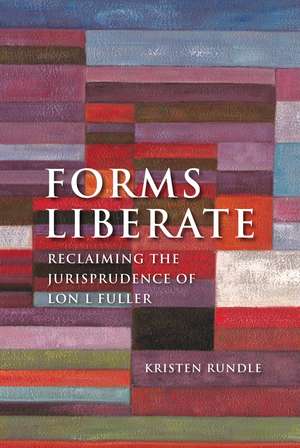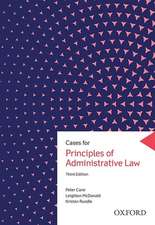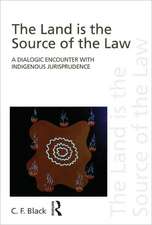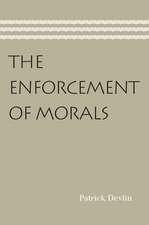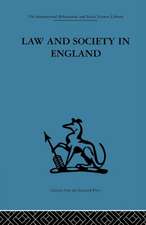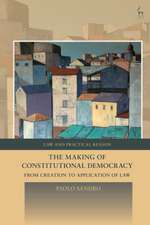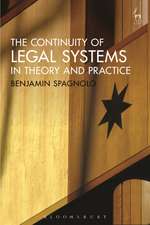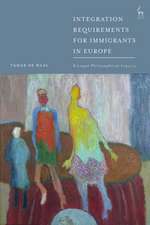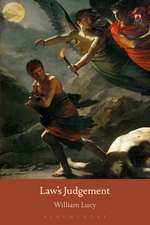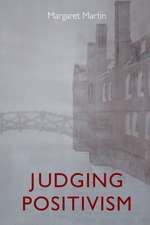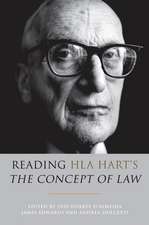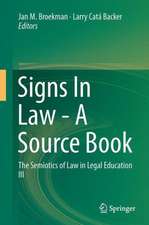Forms Liberate: Reclaiming the Jurisprudence of Lon L Fuller
Autor Kristen Rundleen Limba Engleză Paperback – 27 aug 2013
| Toate formatele și edițiile | Preț | Express |
|---|---|---|
| Paperback (1) | 223.67 lei 6-8 săpt. | |
| Bloomsbury Publishing – 27 aug 2013 | 223.67 lei 6-8 săpt. | |
| Hardback (1) | 510.34 lei 6-8 săpt. | |
| Bloomsbury Publishing – 3 mai 2012 | 510.34 lei 6-8 săpt. |
Preț: 223.67 lei
Preț vechi: 288.32 lei
-22% Nou
Puncte Express: 336
Preț estimativ în valută:
42.80€ • 46.48$ • 35.96£
42.80€ • 46.48$ • 35.96£
Carte tipărită la comandă
Livrare economică 22 aprilie-06 mai
Preluare comenzi: 021 569.72.76
Specificații
ISBN-13: 9781849464963
ISBN-10: 1849464960
Pagini: 222
Dimensiuni: 156 x 234 x 12 mm
Greutate: 0.32 kg
Editura: Bloomsbury Publishing
Colecția Hart Publishing
Locul publicării:London, United Kingdom
ISBN-10: 1849464960
Pagini: 222
Dimensiuni: 156 x 234 x 12 mm
Greutate: 0.32 kg
Editura: Bloomsbury Publishing
Colecția Hart Publishing
Locul publicării:London, United Kingdom
Caracteristici
In this book Kristen Rundle offers a close textual analysis of Fuller's published writings and working papers.In resurrecting Fuller's theory on Law and Morality the author argues that it should not occupy such a marginal place in a field dominated by HLA Hart's legal positivism and Ronald Dworkin's interpretive theory of adjudication.The book demonstrates why Fuller's challenge to a purely instrumental conception of law remains salient for 21st century legal scholarship.Will be of value to all those interested in the jurisprudence of Fuller as well as those interested in legal philosophy more generally.
Notă biografică
Kristen Rundle is a Lecturer in Law at the London School of Economics.
Cuprins
1 Reclaiming Fuller I Form and Agency II What is Being 'Reclaimed'? III About the Book: Method, Material and StructureIV Outline of the Chapters 2 Before the Debate I The Early Fuller: Positivism and Natural Law at Mid-century II Eunomics: A 'Science or Theory of Good Order and Workable Social Arrangements' III Navigating the Labels IV Conclusion 3 The 1958 Debate I Mapping the Debate II Reclaiming Fuller through the Nazi Law Debate III Fuller and Legal Validity IV Conclusion4 The Morality of Law I Mapping The Morality of Law II Hart's Review of The Morality of Law III A Different Path? IV Conclusion 5 The Reply to Critics I Mapping the 'Reply to Critics' II Generality, Efficacy and Agency: Insights from the Archive III Reflections on the 'Reply to Critics' IV Conclusion 6 Resituating Fuller I: Raz I Fuller and Raz II Raz on the Rule of Law III Raz on Authority IV Conclusion: Form, Agency and Authority 7 Resituating Fuller II: Dworkin I Fuller and Dworkin II The 1965 Essays III Dworkin's Project IV Fuller, Dworkin and Interpretation V Fuller, Dworkin and Methodology VI Fuller, Dworkin and the Value of Legality VII Conclusion: Taking Form Seriously 8 Three Conversations I Morality II Instrumentalism III Legality Fuller and Shapiro: A New Conversation? IV Conclusion
Recenzii
There is much of interest in this book for any legal philosopher. It is good to see the various elements of Fuller's work brought together as a larger interconnected project; and the interweaving of published and unpublished materials is a useful aid to deeper appreciation and understanding.
Rundle has written a beautiful book about the 'jurisprudence' of Fuller. This was to be expected for those who were already familiar with her work.(Translated from the original Dutch)
...a highly informative and thought-provoking book, rich in detail, sensitivity and rigour. It succeeds admirably in its aim to re-orientate our understandings of Fuller's thinking, and leaves the reader with the desire to revisit and reflect anew on his central concerns.
In her thoughtful and elegantly written book Forms Liberate, Kristen Rundle offers a host of valuable insights into Lon L Fuller's theory of law and its place within modern jurisprudential thought.
In a rigorous, beautifully written and carefully designed monograph, Rundle draws on both Fuller's published works and archival material to reconstruct a number of Fuller's theses whose interest lies not just in their historical significance but also, and indeed primarily, in the role they can play in the contemporary debate in the philosophy of law.
Rundle successfully reclaims Fuller from the distorted picture that arose in the wake of the Hart-Fuller debate and argues for taking the form of law seriously.
Rundle has written a beautiful book about the 'jurisprudence' of Fuller. This was to be expected for those who were already familiar with her work.(Translated from the original Dutch)
...a highly informative and thought-provoking book, rich in detail, sensitivity and rigour. It succeeds admirably in its aim to re-orientate our understandings of Fuller's thinking, and leaves the reader with the desire to revisit and reflect anew on his central concerns.
In her thoughtful and elegantly written book Forms Liberate, Kristen Rundle offers a host of valuable insights into Lon L Fuller's theory of law and its place within modern jurisprudential thought.
In a rigorous, beautifully written and carefully designed monograph, Rundle draws on both Fuller's published works and archival material to reconstruct a number of Fuller's theses whose interest lies not just in their historical significance but also, and indeed primarily, in the role they can play in the contemporary debate in the philosophy of law.
Rundle successfully reclaims Fuller from the distorted picture that arose in the wake of the Hart-Fuller debate and argues for taking the form of law seriously.
Descriere
In this book, Kristen Rundle offers a close textual analysis of Lon L Fuller's published writings and working papers and shows how his challenge to a purely instrumental conception of law remains salient for twenty-first century legal scholarship.
